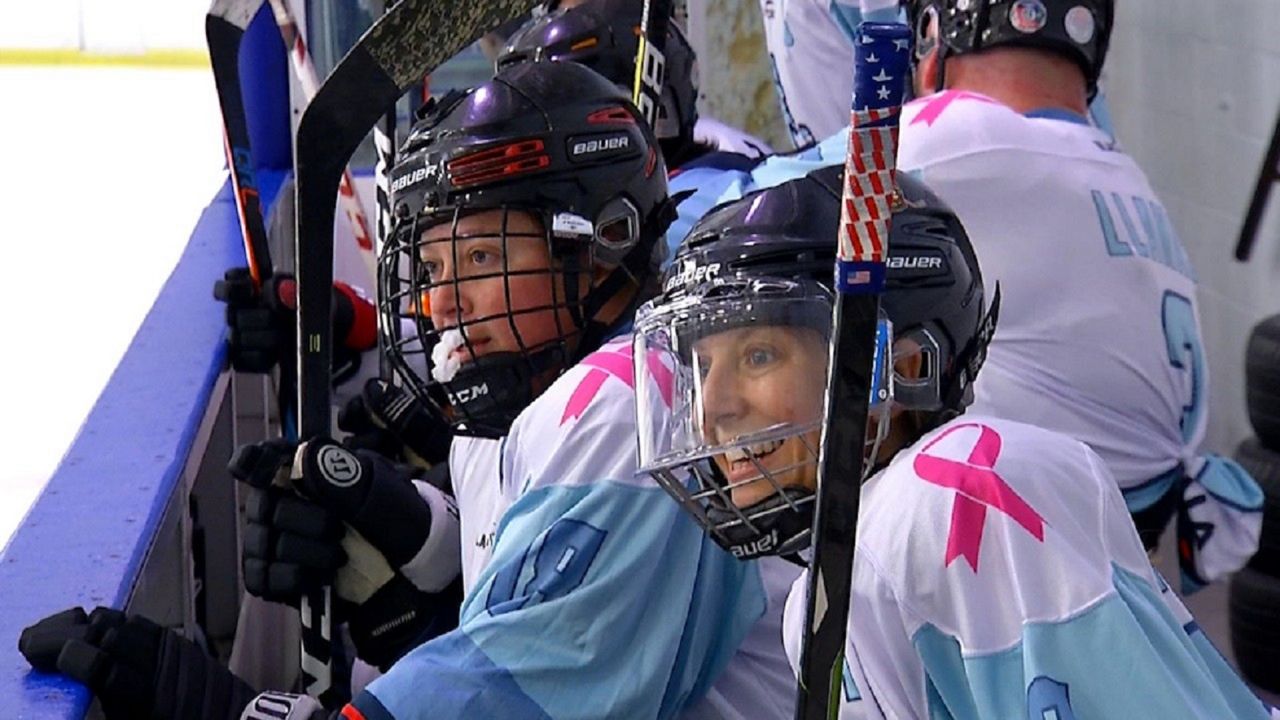CINCINNATI — It's about 6:30 p.m. on a school night.
Sydney Stoughton skates back and forth across the rink at Northland Ice Center in Evandale before the start of hockey practice. It's roughly 25 minutes from her family’s home in Mason.
She’s a member of the Junior Cyclones, a youth club sponsored by the Cincinnati Cyclones. The ECHL professional franchise supports several amateur youth teams through the Cincinnati Cyclones Foundation.
What You Need To Know
- The Cincinnati Cyclones have started several youth hockey teams to help promote the game to women, minorities
- Hockey can post financial and social challenges that can impact accessibility to the sport
- New Cyclones head coach Jason Payne is the only Black head coach in pro hockey
- The Cyclones Foundation is offering ice time, equipment and covering the cost of travel for 75 of their youth players this season
Sydney, 12, is one of two girls on the team. The other girl is also the only player who is Black.
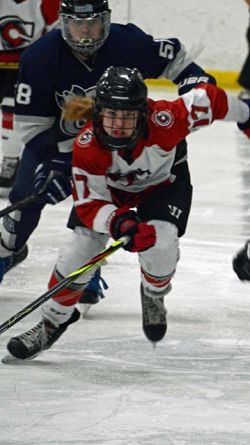
Beyond that, there's only one other non-white male on the team — a 10-year-old named Robbie So, who is Asian. He started skating when he was 4. His dad, Bobby, played hockey, too.
Most of the other players, ranging in age from 10 to 12, are from Cincinnati's northern communities, like West Chester and Liberty Township, coincidentally where the rinks are as well.
Sydney’s team is coached by members of the minor-league staff, including new Cyclones head coach Jason Payne.
Payne is one of only a handful of Black men to ever coach a professional hockey team. He's the only one who currently leads a pro club.
“She’s a natural. Sydney is one of the best on her team,” said Payne, who was a longtime journeyman in the minor leagues before moving into the coaching ranks.
Being a girl, Sydney feels there's a little extra motivation to perform well.
"Playing against the boys, it's a challenge. I feel I'm pretty good, but I still feel I need to prove myself to them," she said. "It's fun. I enjoy the challenge."
As usual, Sydney arrived early, quickly darting onto the ice to warm up. She weaves in and out of the mixture of figure skaters and novices enjoying the pre-practice open skate period.
Space is tight: There aren't a lot of rinks in Greater Cincinnati open in early October.
Sydney is graceful on skates — the cuts, the slashes, the quick stops that send a cloud of ice shards into the air. It's like she’s been skating all her life.
Her grandfather, Blaine Stoughton, played multiple seasons in various professional hockey leagues, including the NHL. He was an all-star in 1982 for the now-relocated Hartford Whalers.
Sydney scored four goals and added three assists in her first tournament of the season.
"I guess it runs in the family," Sydney joked. She said her favorite thing is competing and scoring goals. Her grandpa led the NHL in goals scored in 1979-80, netting 56 that season.
"My goal is to play in the Olympics for Team USA," she added.
A game for everyone
Michael Forrester's twin daughters, Clara and Phoebe, 10, have been experiencing the same challenge as Sydney since they've been old enough to skate. Their older brother, Sam, 12, plays as well.
They all play for the Northern Kentucky Norse, which Forrester coaches.
"I love that my girls are out there rubbing shoulders and fighting for the puck with the boys,” he said. “They are going to be doing that their whole life on or off the ice.”
Having a local pro team, like the Cyclones, helps get kids excited about the game, Forrester said.
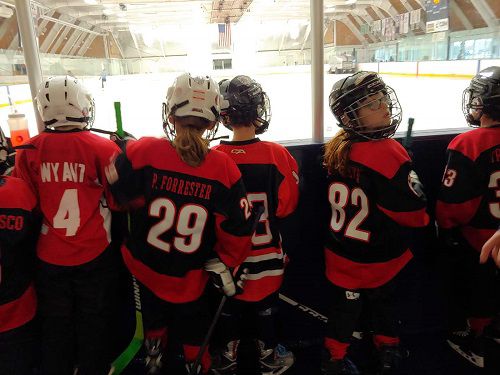
In the past, he's taken his team to several Cyclones games. They've even scrimmaged in between periods.
Over the years, Greater Cincinnati has called several minor league teams home, ranging from the former Mighty Ducks to smaller teams in Dayton, Ohio. Generations past may remember the Cincinnati Stringers, a team for which NHL legend Mark Messier once played.
But it's not quite the same as having a family member push you onto the ice.
"Like any sport, the love of it is often passed down from parent to kid,” Forrester said. “If their parents didn’t play, they may not be exposed to the game.”
That exposure can come in a lot of ways — having a local team, knowing friends who play, or having a parent who played. Forrester grew up playing the game in Oxford, Ohio, home of Miami University. The school has a storied hockey program.
"Hockey isn't a game you can just pick up," he added. "While it doesn’t take long to skate, you do need to be able to skate some. That stops a lot of kids from starting."
The lack of exposure is part of the reason you don't see more non-white or female participants in the sport, Forrester said. But it's not the only reason.
The game is expensive; new skates, sticks, gloves all add up. Then, there are travel considerations as many teams have to hit the road to face other competitive teams.
Depending on where in the country you live, finding an ice rink can also be a challenge.
"All of Cincinnati's rinks are out in the suburbs. They can be hard to get to and it's impossible if you don’t work a traditional schedule," Forrester said.
Important to see ‘a face like mine’
Another important factor is representation. For years, hockey has been considered a largely “white sport.”
As of last winter, the NHL had only 90 BIPOC (Black, Indigenous, People of Color) players in its system, with 44 of them active, per Global News. There are more than 700 players in the NHL.
The Cincinnati Cyclones have one person of color on their roster heading into the 2021-22 season: Dajon Mingo, a defenseman from Michigan who attended college at Bowling Green State University.
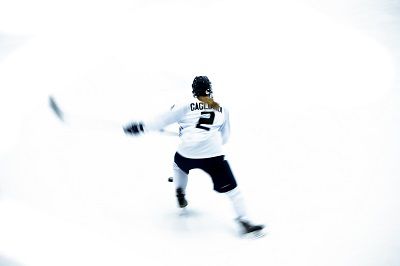
You also don't see much women's hockey on TV unless it's during the Olympics.
Being able to see someone who looks like you playing the sport you love is important, Payne said, especially if you think it's a sport you could take to the next level.
Growing up in Canada, Payne had the option to play other sports. But he saw kids similar to himself on the ice. He also received a push from his family to play the game they grew up enjoying.
But not all kids have that.
"There are a few different challenges for getting more diversity in hockey, but the main one comes from the adage, 'You can't become what you can't see,’" said Alyssa Gagliardi, a Girls and Women’s Hockey Specialist for the NHL's Carolina Hurricanes, formerly the Whalers.
Her love of hockey took her to college at Cornell and then the pro ranks. She even wore a United States National Team sweater in two Four Nations Cups (2014 and 2015).
"Having more diversity in positions from coaching, to operations, to broadcasting, is all incredibly important for the next generation to see what opportunities could be available to them," Gagliardi added. "Diversity in hockey, like in any industry really, is important in that it helps push everything forward."
Gagliardi sees growth as being important at all levels of hockey, whether it's on the ice, in the front office or filling seats at the arena.
Giving back to move the game forward
The Cincinnati Cyclones want to grow their fan base. It’s not just good for business, it’s also good for the game.
The franchise formed the Cincinnati Cyclones Foundation in December 2016 with a goal of growing the love of hockey across the region.
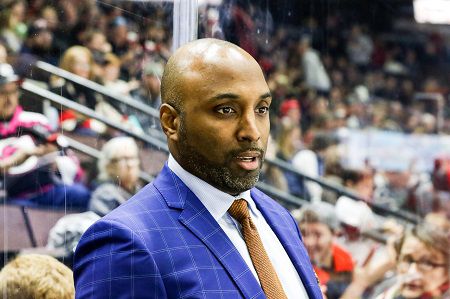
The foundation assists youth players with costs associated with playing hockey. They also provide them and their teams with ice time, whether at their home rink at Heritage Bank Center or other hockey or skating facilities around Cincinnati and Northern Kentucky.
"We know a lot of kids may never have had the access to play or ability to play due to financial reasons, so we want to help take away some of those barriers," Payne said.
Payne, who played for the now-defunct Dayton (Ohio) Bombers of the ECHL, knows the local hockey scene quite well. He’s been on the Cyclones staff since 2018.
The creation of the foundation also allowed the Cyclones to expand their youth program. Over the past five years, the foundation has grown to include three youth-level teams and a junior hockey team, ages 16 to 18, playing in the USPHL. All told, that includes about 75 total players. They have plans to continue expanding.
The Cyclones are also working to create the next round of general managers, scouts and coaches.
The team tries to regularly visit throughout the region to provide clinics and meet-and-greet events at local schools. They also invite groups of students to the games.
“This program has a lot of goals — but one of the major ones is to make sure kids see hockey as a possible opportunity,” Payne said.
He is hopeful one day he’ll see one of his “homegrown” talents wearing a professional jersey somewhere in the world. Maybe even in Cincinnati.



